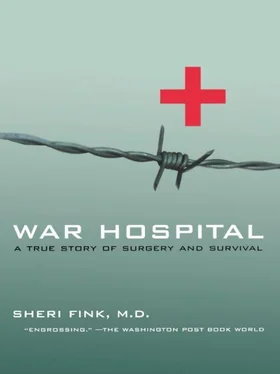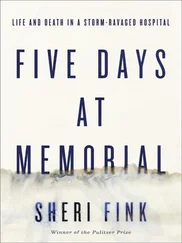One day Eric stood up from his TV set and decided to do something to help the war’s victims. He made an appointment at the Brussels office of Doctors Without Borders and asked to be sent to Baghdad. When they told him they didn’t work there, he deemed them a bunch of fraidy-cat “wankers” and went home. That was it. He’d considered it just one afternoon. But two weeks later, someone from the aid organization called him back. Kurds were fleeing Iraqi air strikes in long columns toward the north. They needed assistance. Could Eric go?
He went, not knowing much at all about the organization that the French-speaking call by the acronym MSF, for Médecins Sans Frontières . He knew them only by their poster campaigns, which proclaimed, “We didn’t study medicine to cure imaginary patients.” Eric interpreted this to mean that they got things done for people in need and challenged prevailing attitudes. He liked those who “shook the tree” a little bit.
MSF had been born kicking and screaming its way out of the Red Cross in Biafra, Nigeria, in the late 1960s. As Nigerian forces brutally squelched a secessionist struggle, a group of young French Red Cross doctors arrived to find famine sweeping across the rebel-controlled area. The doctors could do nothing to help. Hands tied by the International Committee of the Red Cross’s strict operating procedures (based on international conventions not yet updated to cover internal armed conflict), the doctors could not deliver crucial food supplies to rebel areas without the consent of the official government. The Nigerians weren’t willing to give it. Even worse, as evidence of genocide against the Biafrans grew, the Red Cross kept silent. This infuriated the French doctors. Thirty years earlier, Red Cross officials had failed to speak out about the mass deportations they documented during the Holocaust. That inaction had led some progressive intellectuals to discredit the very concept of humanitarianism. “The ethics of the Red Cross,” one ranted in a criticism of Camus’s The Plague , “are solely valid in a world where violence against mankind comes only from eruptions, floods, crickets or rats. And not from men.”
The French doctors in Biafra seemed to agree. They revolted and broke their International Red Cross pledge to “abstain from all communications and comments on its mission.” They accused the Nigerian government of genocide and the Red Cross of failing to provide aid as famine ravaged the region. After leaving the Red Cross, they founded the group that would, in 1971, become MSF.
MSF took the rigid, law-based approach of the Red Cross and bent it. Staying at work night after night, red-rimmed eyes burning with conviction and the smoke of dozens of cigarettes, its founders crafted a new philosophy of humanitarianism: MSF would go wherever people suffered, regardless of political or military boundaries, with or without permission. Aid workers would bear public witness to outrages, from human rights violations to the blocking of humanitarian relief.
Although some came to consider the typical MSF volunteer an adventurer or, in the words of a former MSF worker, a “naïve, Schweitzerlike individual, who seeks to change the world through medical skills and goodwill,” the idea of humanitarian doctors who went where needed, blind to all obstacles, and spoke out about what they saw, took off in the public imagination.
“The age of the ‘French doctors’ rapidly replaced that of heroes in the mould of Che Guevara—the latter more romantic, undoubtedly, but disqualified by reason of their enthusiasm for gulags,” wrote Rony Brauman, president of MSF-France, in the early 1990s. “The humanitarian volunteer, a new, newsworthy figure, neither statesman nor guerrilla, but half-amateur and half-expert, began to appear at the flashpoints which light up the progress of history… the victim and his rescuer have become one of the totems of our age.”
By the late 1970s, the world began catching up. The 1977 Second Additional Protocol to the 1949 Geneva Conventions—the modern version of humanitarian law aimed to protect civilians, the injured, and other noncombatants from the effects of war—authorized humanitarian assistance even in internal armed conflicts, situations increasingly common after World War II. Dozens of similar groups, known as nongovernmental organizations or “NGOs,” formed around the world, an alphabet soup that included IMC (International Medical Corps) in the United States and MDM (the French acronym for Doctors of the World) in France. They recruited doctors and other experts to volunteer for varying amounts of time—from a few weeks to a few years—providing medical or technical assistance to those in need. Each had its own philosophies and strengths; MSF specialized in acute conflict and disaster assistance.
When Eric Dachy went to MSF in 1991 it was the beginning of what cultural critic David Rieff dubbed the “era of the NGOs.” Governments and funding agencies increasingly chose non-governmental organizations to implement aid programs because of their efficiency compared with large, intergovernmental organizations such as the United Nations. More importantly, the “right to intervene” to alleviate human suffering, which MSF co-founder Dr. Bernard Kouchner dubbed droit d’ingérence , was perched to leap from operating principle of humanitarians to foreign policy of nations.
In April 1991, MSF assigned Eric to the border of Iraq and Turkey to respond to one of the largest and fastest refugee outflows in recent history. Saddam Hussein’s forces’ brutal suppression of a Kurdish uprising in the wake of the Gulf War sent up to 2 million Iraqi Kurds fleeing northward toward Turkey and Iran. Making an unprecedented linkage, United Nations Security Council Resolution 688 labeled Iraqi “repression” a “threat to international peace and security” and insisted that Iraq allow humanitarian organizations to assist the displaced. Kouchner, who had left MSF and become a French government minister for health and humanitarian action, helped draft the historic resolution.
A U.S.-led thirteen-nation coalition force then created a “safety zone” in northern Iraq, allowing aid workers to operate and Kurdish refugees to return home. Operation Provide Comfort erased the thick line between military and humanitarian work and so marked a new development in the discipline of humanitarian aid. Groups such as MSF, the United Nations High Commissioner for Refugees (UNHCR), and the Red Cross worked in cooperation with coalition troops. Kouchner championed state involvement in aid delivery, arguing that humanitarian intervention was inherently political and NGOs were too weak to accomplish their objectives when opposed by controlling powers. More traditional humanitarians, though, argued that states’ intentions could not be purely humanitarian and worried that involvement with the military would undermine their own neutral status.
Eric Dachy packed his bags quite unaware of and uninterested in any philosophy of humanitarianism. He joined MSF because he wanted to do “something altruistic” for the Kurds. As a physician bored with the sprained ankles and tummyaches of suburban general practice, he was simply looking for the chance to treat and even cure patients with serious health problems. He arrived in Üzümlü, a muddy, hilly border village full of mountain views, Kurdish refugees, and cholera, and spent the next three months treating hundreds of very sick and shell-shocked patients with a combination of medicine and psychotherapy. He marveled at how instantly useful he felt as a doctor. His boredom vanished.
Eric returned to Belgium and told MSF he wanted to do it again. He closed his medical practice and awaited his next assignment. It came quickly. Labeled an expert after just three months in the exigent world of aid work—with its ever-shifting cadre of workers, never quite enough of them, never quite as well-trained or experienced as they should be—MSF sent him to central Africa to help the government of Chad fight cholera.
Читать дальше












